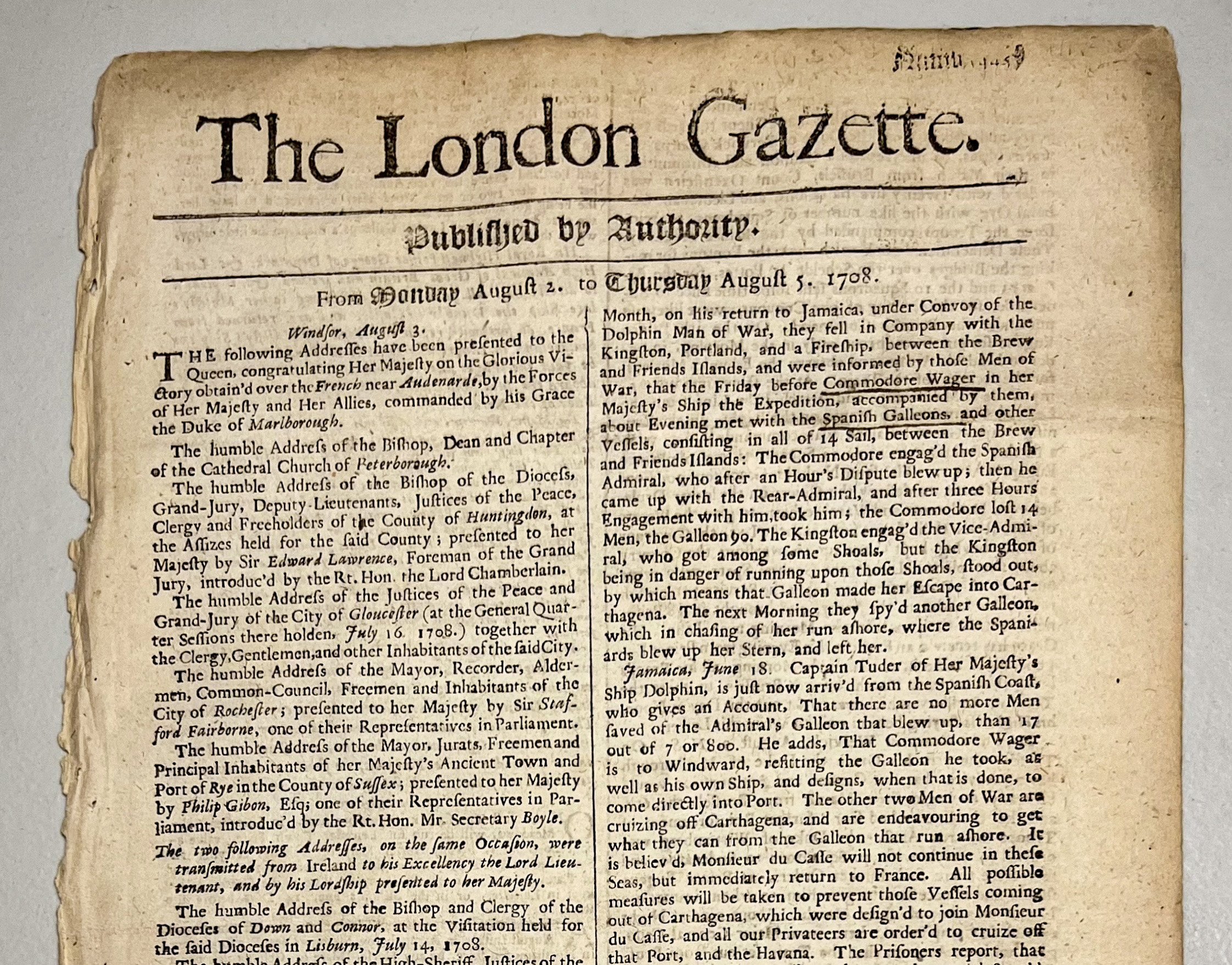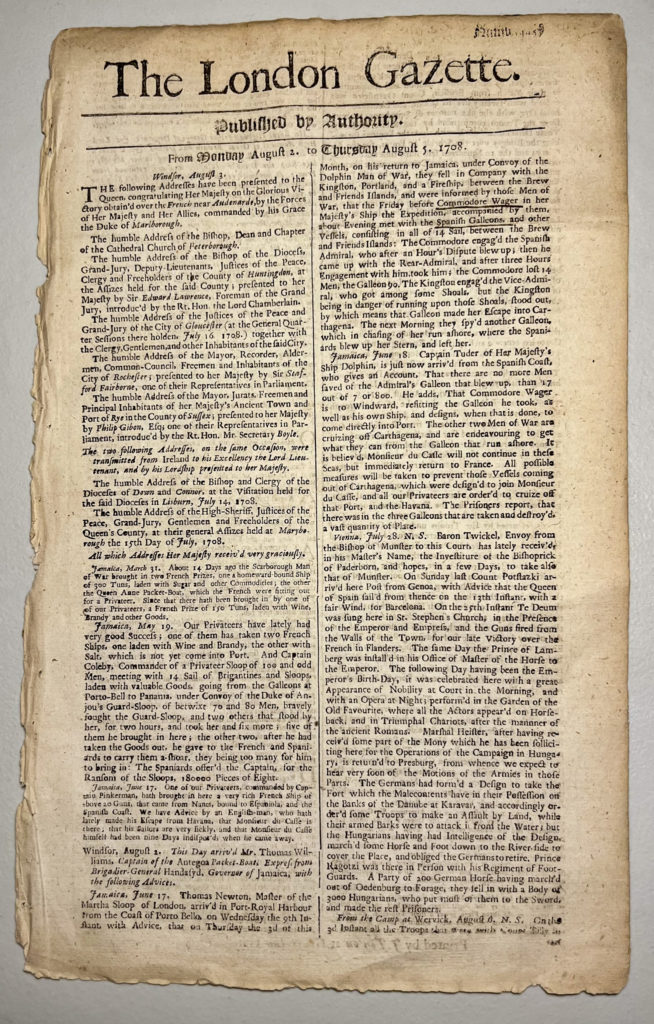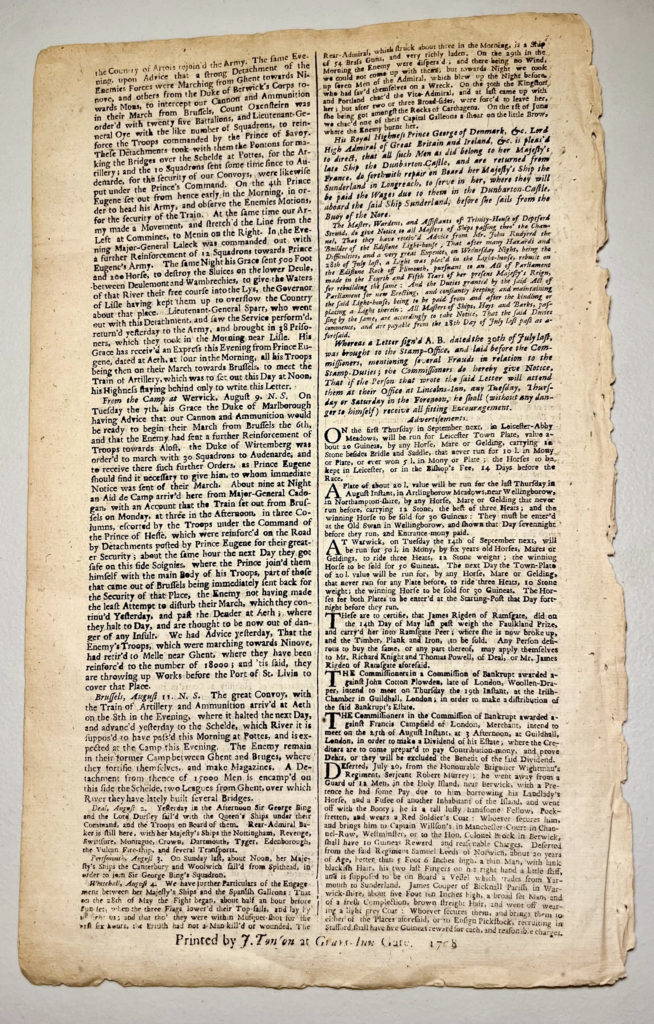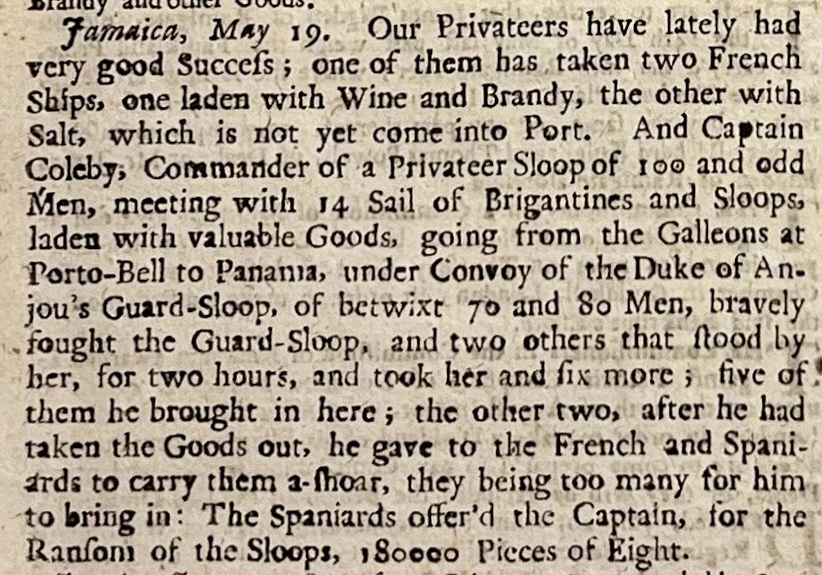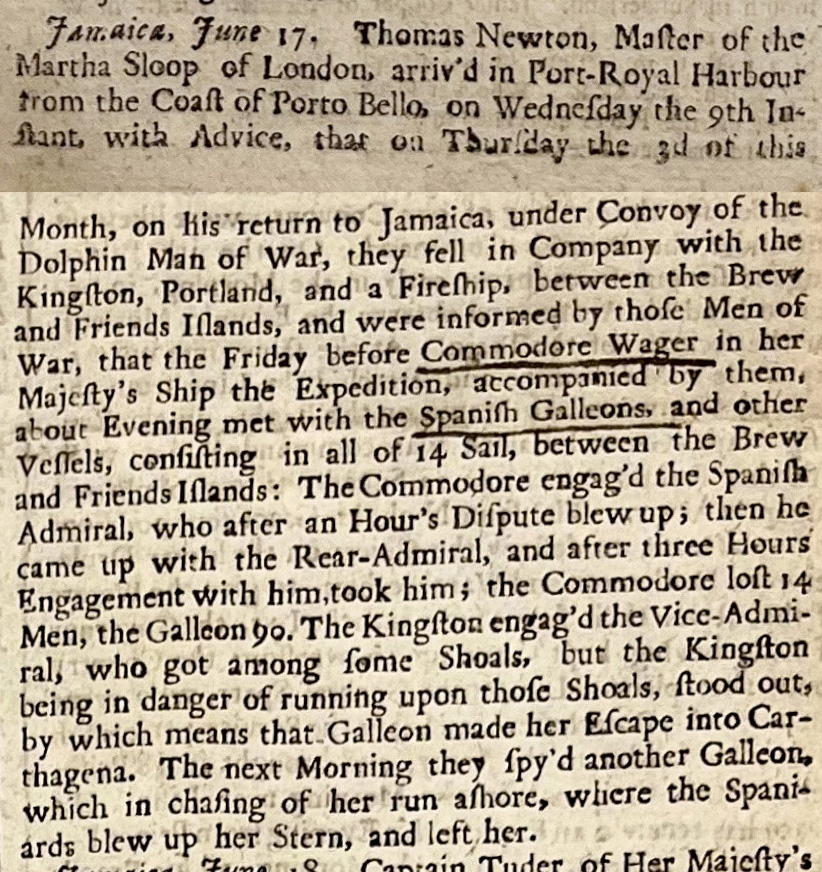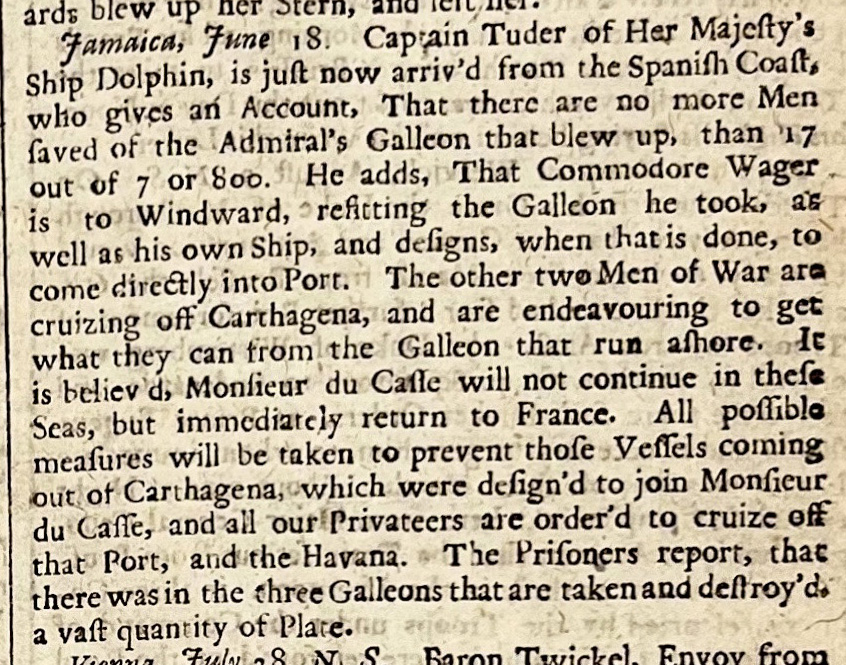Our continued reporting on the San Jose lead to us being contacted by Fleet Society member Matt Puleo (Member # 183 Tampa, Florida), with an interesting story. Matt happened to come across an old newspaper for sale that referenced a naval battle in the Caribbean during the War of Spanish Succession. Thinking that it might be a nice addition to his 1715 Fleet-era collection he decided to buy it. When he received the old newspaper (The London Gazette) he was shocked to discover that the naval battle referenced just happened to be an account of the sinking of the San Jose! At my request, Matt prepared an article (see below) with a link to a modern translation of the newspaper for easier reading. Given the attention that has been devoted to the San Jose, its loss, rediscovery, and recovery, this old newspaper article represents a firsthand account of what happened at the time of the sinking. Special thanks to Matt Puleo for his contribution to our ongoing study of the San Jose and its impact on our understanding of 1715 Fleet-era events.
Recently I acquired an August 2nd to August 5th, 1708, edition of the London Gazette from well-known and respected historic newspaper collector and dealer, Dr. Stephen Goldman. The newspaper piqued my interest as it was listed as having information about a naval battle in the Caribbean during the War of Spanish Succession. While closely reading the document I noticed the newspaper was reporting on Commodore Charles Wager’s battle with the Spanish Navy off of Cartagena, Colombia in 1708. This naval engagement, known as Wager’s Action, resulted in the loss of the Spanish Treasure Galleon San José. The newspaper gives important context surrounding Commodore Wager’s victory against the Spanish off of Cartagena and the sinking of the San José at the hands of British forces. Such as a count of how many individuals survived the sinking of the San José is provided in “That there are no more Men saved of the Admiral’s Galleon that blew up, than 17, out of 7 or 800”, and that “the Prisoners report, that there was in the three Galleons that are taken and destroy’d a vast quantity of Plate”. In the context of 18th-century English, the word “Plate” refers to treasure. It is derived from the Spanish word Plata, meaning silver.
At the time of writing this article, I have not yet been able to find another example of this particular newspaper issue, other than a scan within the London Gazette’s online database, which can be seen here at https://www.thegazette.co.uk/London/issue/4459/page/1/data.pdf.
The bottom left of the newspaper also reports on the happenings of Privateers, who were state-sponsored pirates, and their exploits in the Caribbean during the War of Spanish Succession. The newspaper details English privateers in the Caribbean taking French and Spanish ships laden with valuable goods. In a particular instance in the newspaper, it is quoted that “The Spaniards offer’d the Captain, for the Ransom of the Sloops, 180,000 Pieces of Eight”.
Below is a fully transcribed copy of the newspaper’s reports about the Privateers and the San José:
Jamaica, March 31. About 14 Days ago the Scarborough Man of War brought in two French Prizes, one a homeward-bound ship of 300 Tuns, laden with Sugar and other Commodities; the other the Queen Anne Packet-Boat, which the French were fitting out for a Privateer. Since that there hath been brought in by one of our Privateers, a French Prize of 150 Tuns, laden with Wine, Brandy and other Goods.
Jamaica, May 19. Our Privateers have lately had very good Successes; one of them has, taken two French Ships, one laden with Wine and Brandy, the other with Salt, which is not yet come into Port. And Captain Coleby, Commander of a Privateer Sloop of 100 and odd Men, meeting with 14 Sail of Brigantines and Sloops, laden with valuable Goods, going from the Galleons at Porto-Bello to Panama, under Convoy of the Duke of Anjou’s Guard-Sloop, of betwixt To and 8o Men, bravely fought the Guard-Sloop, and two others that stood by her, for two hours, and took her and six more; five of them he brought in here; the other two, after he had taken the Goods out, he gave to the French and Spaniards to carry them ashore, they being too many for him to bring in: The Spaniards offer’d the Captain, for the Ransom of the Sloops, 180,000 Pieces of Eight.
Jamaica, June 17. One of our Privateers, commanded by Captain Pinkerman, hath brought in here a very rich French Ship of above 20 Guns, that came from Nants, bound to Hispaniola, and the Spanish Coast. We have Advice by an English-man, who hath lately made his Escape from Havana, that Monsieur du Casse is there; that his Sailors are very sickly, and that Monsieur du Caffe himself had been nine Days indispos’d, when he came away.
Windsor, August 2. This Day arriv’d Mr. Thomas Williams, Captain of the Antegoa Packes-Boat, Express from Brigadier General Handasyd, Governer of Jamaica, with the following Advices.
Jamaica, June 17. Thomas Newton, Master of the Martha Sloop of London, arriv’d in Port-Royal Harbour from the Coast of Porto Bello, on Wednesday the 9th instant, with Advice, that on Thursday the 3rd of this Month, on his return to Jamaica, under Convoy of the Dolphin Man of War, they fell in Company with the Kingston, Portland, and a Fireship, between the Brew and Friends Islands, and were informed by those Men of War, that the Friday before Commodore Wager in her Majesty’s Ship the Expedition, accompanied by them, about Evening met with the Spanish Galleons, and other Vessels, consisting in all of 14 Sail, between the Brew and Friends Islands: The Commodore engag’d the Spanish Admiral, who after an Hour’s Dispute blew up; then he came up with the Rear-Admiral, and after three Hours Engagement with him, took him; the Commodore lost 14 Men, the Galleon 90. The Kingston engag’d the Vice-Admiral, who got among some Shoals, but the Kingston being in danger of running upon those Shoals, stood out, by which means that Galleon made her Escape into Carthagena. The next Morning they spy’d another Galleon, which in chasing of her run ashore, where the Spaniards blew up her Stern, and left her.
Jamaica, June 18. Captain Tuder of Her Majesty’s Ship Dolphin, is just now arriv’d from the Spanish Coast, who gives an Account, That there are no more Men saved of the Admiral’s Galleon that blew up, than 17 out of 7 or 800. He adds, That Commodore Wager is to Windward, refitting the Galleon he took, as well as his own Ship, and designs, when that is done, to come directly into Port. The other two Men of War are cruizing off Carthagena, and are endeavouring to get what they can from the Galleon that run ahore. It is believ’d, Monieur du Cafle will not continue in these Seas, but immediately return to France. All possible measures will be taken to prevent those Vessels coming out of Carthagena, which were design’d to join Monsieur du Casse, and all our Privateers are order’d to cruise off that Port, and the Havana. The Prisoners report, that there was in the three Galleons that are taken and destroy’d a vast quantity of Plate.
BIO: Matthew Puleo is a native Floridian who has been drawn to and near the water for the majority of his life. Having been introduced to the story of the 1715 fleet and other historic shipwrecks off of Florida at a young age he quickly took an interest in learning how to scuba dive. Matthew learned to Scuba dive at 14 and he has used the years since then to advance his education in diving. In 2023 he was offered and took up the position of being the assistant to Jim Wilson, the regional director of the 1715 Fleet Society for the Treasure Coast Region of Florida. Matthew is currently a full-time student at the University of South Florida majoring in Health Sciences. He also works part-time as a Scuba Tank Specialist at Gulf Coast Divers in Tampa, Florida. Whenever Matthew is diving he usually has either a metal detector or an underwater camera with him.
